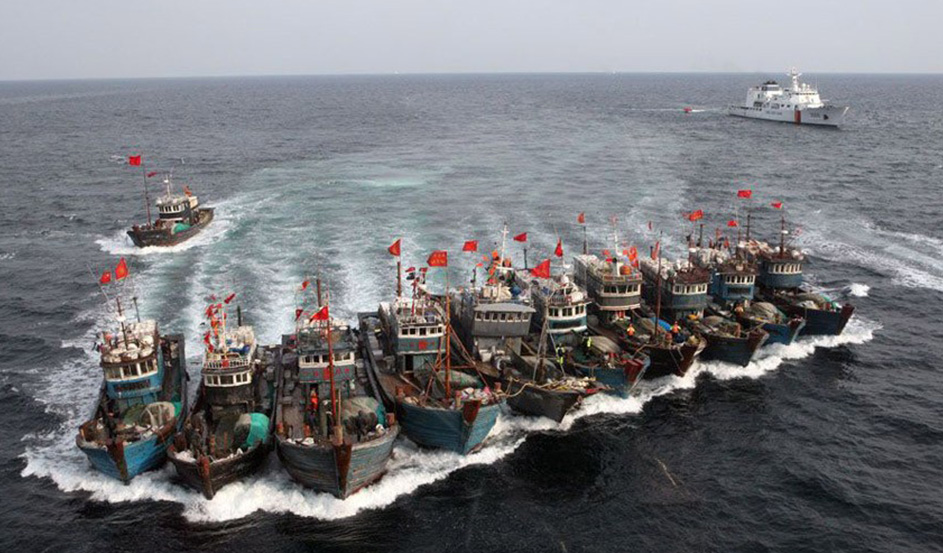
SUSTAINABILITY – AN ONGOING ISSUE
Sustainability has become an increasingly important term in the culinary world and is a key concern for chefs, along with their focus on sustainability and locality.
So what is the problem?
Overfishing occurs when fish and other marine species are caught faster than they can reproduce. It is the result of growing demand for seafood around the world, combined with poor management of fisheries and the development of new, more effective fishing techniques. If left unchecked, it will destroy the marine ecosystem and jeopardise the food security of more than a billion people for whom fish are a primary source of protein.

It has been estimated by the United Nations Food and Agriculture Organisation that over 70% of the world’s fish stocks are either fully exploited or depleted
It has been estimated by the United Nations Food and Agriculture Organisation that over 70% of the world’s fish stocks are either fully exploited or depleted. Most of the problems associated with over fishing have been caused in the last 50 years by the growing human population demanding food and rapid advances in fishing technology . There used to be hundreds of trawlers and fishing boats based at ports like Peterhead, Grimsby and Great Yarmouth, but many of these have now been replaced by huge factory ships which are able to stay out at sea for weeks at a time. These factory boats have all the equipment necessary either to freeze or tin fish caught by their hunting ships, so that they need to return to base only when their holds are full.
With the introduction of the new factory boats, there was a 7% growth in catches every year during the 1950’s and 60’s, but since then there has been little increase in catch size and many of the world’s most important fisheries have closed down, with many more suffering so badly from over fishing that they are unlikely to recover.
In the 1970s a serious dispute broke out between British and Icelandic fishermen over the Icelandic cod fisheries. British trawlers continued to fish for cod despite a ban on fishing put into place by the Icelandic government, and there were confrontations between British and Icelandic trawlers, which became known as the “Cod War’.
There is now a 100-mile exclusion zone around Iceland, in which foreign boats are not allowed to fish, so Icelandic cod stocks are starting to improve, though it is unlikely that they will ever recover fully. Most cod on sale in Britain is sourced from Iceland and the Barents Sea.
In 2007, stocks of North Sea cod reached a historic low of 37,400 tonnes. Major conservation efforts including cuts in landing quotas have resulted in a 52% recovery in 2010 with an estimated stock of 54,200 tonnes. However, this figure is still well below previous figures – 250,000 tonnes in the 1970s, for example. Stocks caught by English and Welsh boats are said to have declined by as much as 86% since 100 years ago. The North Sea cod are still recovering and it is too early to say they are sustainably sourced and okay to start eating again.
In addition; these modern fishing vessels mentioned above catch staggering amounts of unwanted fish and other marine life. It’s estimated that anywhere from 8 to 25 percent of the total global catch is discarded, cast overboard either dead or dying. That’s up to 27 million tonnes of fish thrown out each year. All modern forms of commercial fishing produce bycatch, but shrimp trawling is by far the most destructive: it is responsible for a third of the world’s bycatch, while producing only 2% of all seafood.
Shrimp (and many deep-sea fish) are caught using a fishing method called bottom trawling, which usually involves dragging a net between two trawl doors weighing several tons each across the ocean bed. This has a destructive impact on seabed communities, particularly on fragile deep water coral – a vital part of the marine ecosystem that scientists are just beginning to understand. The effect of bottom trawling on the seafloor has been compared to forest clear-cutting, and the damage it causes can be seen from space. The UN Secretary General reported in 2006 that 95 percent of damage to seamount ecosystems worldwide is caused by deep sea bottom trawling.
So who is working on improving the situation?
The Common Fisheries Policy (CFP) is the fisheries policy of the European Union (EU). It sets quotas for which member states are allowed to catch what amounts of each type of fish, as well as encouraging the fishing industry by various market interventions. In 2004 it had a budget of €931 million, approximately 0.75% of the EU budget.
In February 2013 the European Parliament voted for reform of the Common Fisheries Policy, including measures to protect endangered stocks, and the ending of discards. The new CFP is due come into effect from 2014, though more talks with EU governments are involved. In presenting the reform package, the German Social Democrat MEP Ulrike Rodust stated: “As of 2015 the principle of maximum sustainable yield shall apply… Our objective is that depleted fish stocks recover by 2020. Not only nature will benefit, but also fishermen: bigger stocks produce higher yields.” The 2013 reform led to a greater role for the European Parliament, involving the convening of a trilateral dialogue (or ‘trilogue’) between the European Union, European Commission and the Parliament, to work towards general agreement on reforming the CFP
A high-profile public campaign led by the chef Hugh Fearnley Whittingstall has called an end to the discarding of fish. Partly in response to the campaign, the European commission has proposed a phased-in ban on discards, which the UK government has backed in Brussels. But the environment and rural affairs committee published a report in 2012 for the practice to be allowed to continue until 2020 at least. The MPs said it had not been proved how many fish died after being discarded and called for more research. They cast doubt on whether it was possible to end discards.
“We are concerned that, by deciding to implement a discard ban swiftly and without full engagement with stakeholders, the commission risks creating a scheme that will be unworkable, or worse, will merely shift unwanted fish in the sea to unwanted fish on land,” the committee said.
Anne McIntosh, who chairs the committee, said: “Everyone is appalled by revelations about the levels of discarding. We heard first-hand from fishermen in Hastings how frustrating it is for them to have to throw back perfectly good cod into the sea. The commission is right to want to tackle this, but we are concerned that a kneejerk reaction to the public outcry will do more harm than good. The last thing that we want to see is unwanted fish in the sea becoming unwanted fish in landfill.”
So this gives you an idea about the current situation, however during our research we came across this fantastic animation entitled The Story of Sushi (by Bamboo Sushi) which really does a much more entertaining job of telling the story.
For more on all this please refer to the original sources:
http://saveourseas.com/threats/overfishing
http://www.ypte.org.uk/environmental/over-fishing/29
http://www.un.org/events/tenstories/06/story.asp?storyID=800


